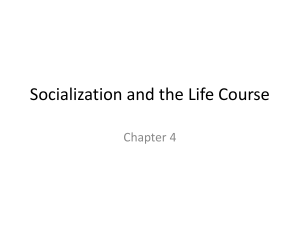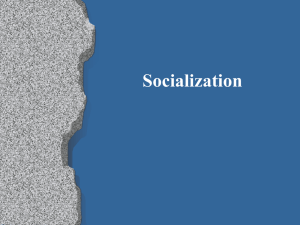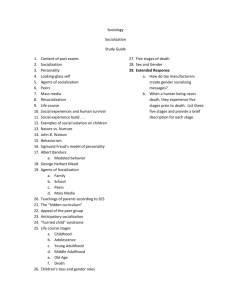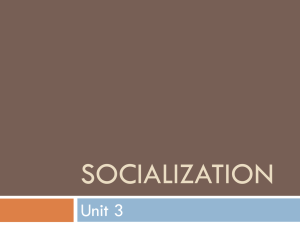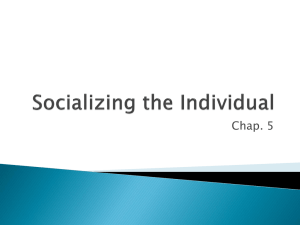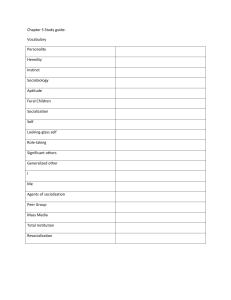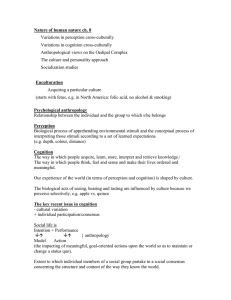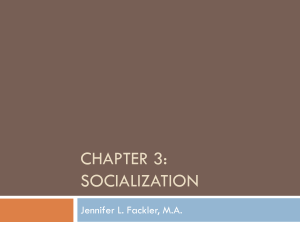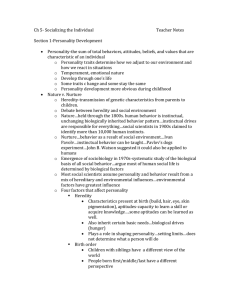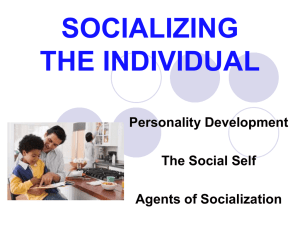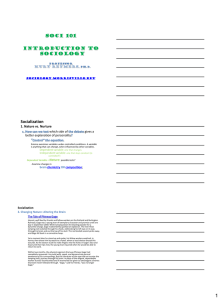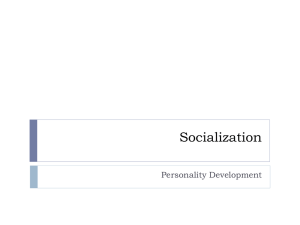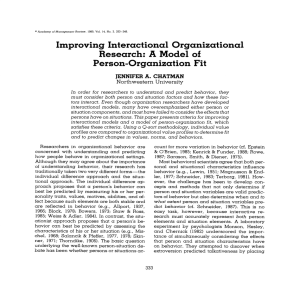Chapter Five Socialization and Personal Development
advertisement
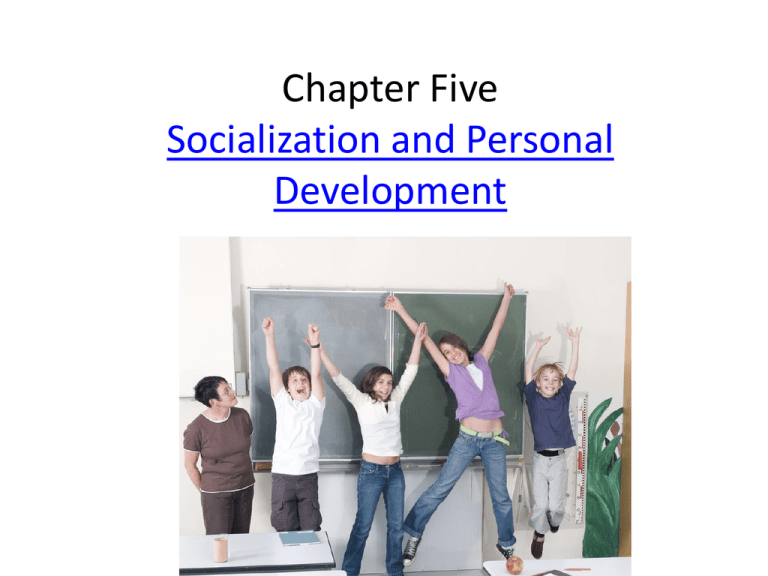
Chapter Five Socialization and Personal Development Pair & Share…. Does how a teacher views a student play a role in school performance? Nature vs. Nurture • Nature: what we bring into the world from birth • Nurture: what we learn or gain via our interactions Are criminals genetically programmed? Are people biologically flawed? Are people predisposed toward criminal behavior? Sociobiology • Human development is attributed to both: usually with an emphasis on nurturing. But….Gender differences (biology) play a role such as males pursuing females; tend to be more aggressive physically; mother’s protective instinct… “Do you believe in the boys will be boys philosophy?” Question: is a child’s behavior always the parents fault???? Physical Traits • Not culturally neutral • Beauty = goodness • Attractive People are Punished Less Personality • Social scientists suggest that we inherit temperament (predisposition to act in a certain way) • Most agree that nature sets limits for intelligence and aptitude. But environment determines the extent to which we reach our limits. • But as children grow up they acquire personalities and refine traits. Activity Think about how others perceive you. Write down 5 adjectives. Personal Development • Charles Horton Cooley: The Looking-Glass Self • Understanding of our existence (ability to think of ourselves as individuals) • Single most important factor in personality formation is how we interpret other people’s perception of how we look and act. • We consider how we believe other people see us. • We interact with others and interpret how they treat us • Based on our interpretations – we develop an image of ourselves. Looking Glass Self Important to remember: 1. Not all “others” are equally important. “Significant others” are more important. 2. It is not a 1 way mirror. What if our perceptions are wrong? (anorexia) George Herbert Mead • Symbolic Interactionalist • Questioned personality formation and believed self-image was the produced by social interaction. • Children learn who they are by taking on roles of others in play. Mead’s 3 stages: 1. Imitation stage (1st 2 years… imitates gestures and sounds). 2. Play stage: child assumes the roles of others (role playing of the person). By playing they learn what is acceptable and not acceptable. 3. Game stage: Assumes the roles – not just the person. Learn that people behave the way they do b/c of a role. At this stage, children learn that not all roles are equal. Sigmund Freud • Pointed out the role of biological forces • Harmony is not possible b/c of unavoidable conflict between the needs of the individual and society. • Id: Wants what it wants and wants it NOW! • Ego: The role is to balance the id and superego. • Superego: Socialization process where we learn what is right and wrong. “The policeman” Jean Piaget • Sensorimotor (Birth to 2): Infant has not developed a sense of self. No sense of cause and effect; babies cry from discomfort. – Object permanence (10 months) • Preoperational stage (2 – 7): Use of symbols but doesn’t understand what they mean (ie… counting / numbers) Jean Piaget • Concrete Operations Stage (7 – 12): – Reasoning ability begins here – Can understand concepts: numbers, speed, weight, size, and volume – Begin to understand the roles of others and other perspectives. Jean Piaget • Formal Operations Stage (12+): • Ability to reason and think about objects and events in an abstract context • Personality may change and self-concepts Carousel There are 4 posters around the room. Jot down thoughts on how they influence our personality, culture, and sense of identity. Family School Peer Groups The Church Media The Socialization Process • Selective Exposure and Modeling (Responsive Classroom – logical consequences) Studies have shown that children are great imitators of adult behavior. “Do as I say… not as I do…” Agents of Socialization • Family: Best possible place to develop a positive self image and positive set of beliefs, attitudes, and values. (On the negative side…) • School: Child learns how to function in an organized society; sense of societal identity. • Peer Groups: Individuals who are similar in age and position. • The Church: Can influence belief systems • Media: Ability to transcend time, geography, and culture. Information creates a common culture. (May have both positive/negative influence on culture) Media And Aggression • Social researchers concerned w/ brutal acts and sexually explicit material being viewed. • By 18: Views see 18,000 people being killed, raped, stabbed, beaten unconscious, or robbed. • Research shows positive correlation between violent shows and aggressive behavior. Rewards and Punishments • Powerful tools in the socializing process. • Also can be a source of mental illness Resocialization • Process of stripping away old values and behavior patterns so those new ones may be introduced. • (ie… military personnel, mental patients, cult members, prisoners of war) • “Total institution” individual is completely controlled for the purpose of erasing previous socialization and substituting new values and behavior patterns Total Institution Two phases: 1. 2. 3. Individuals are stripped of their old identify Personality is reconstructured As with children (1, 2, 3 magic / time out) (reward and punishment) (ie. token economy) Ultimately, individuals will develop a belief system to justify their new values and behaviors. Prisons do not work b/c little effort is made to provide new models for acceptable behavior. Boot camps for juveniles have been successful b/c of introduction of positive role models.
